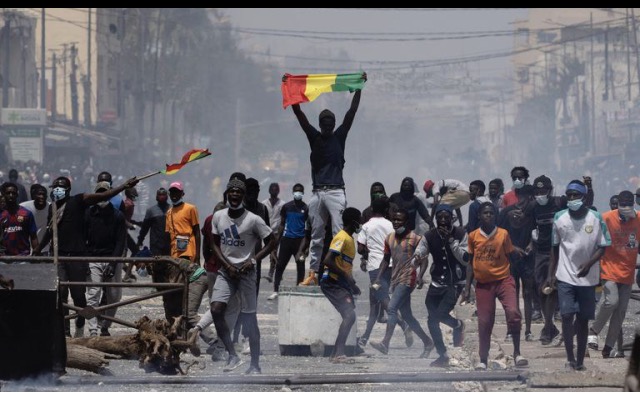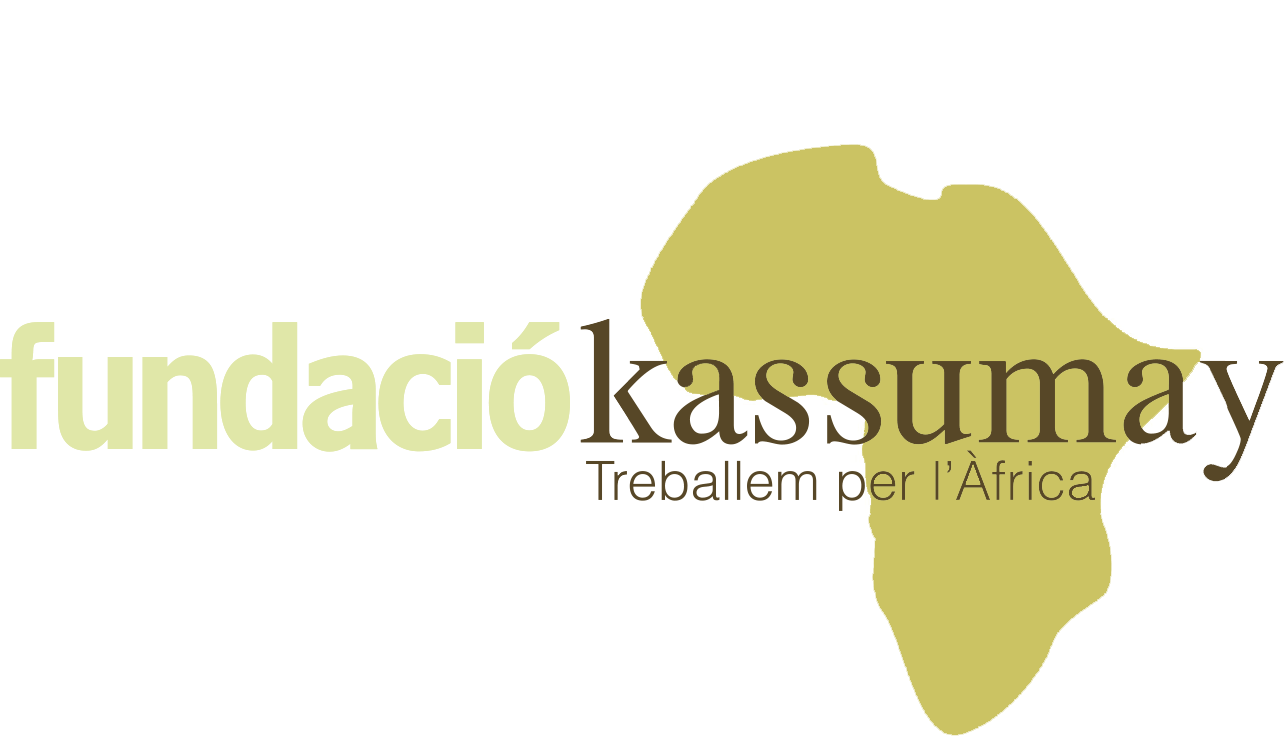SENEGAL – INFORMATION / MARCH 2021
Senegal is a former French colony that achieved independence in 1960. Its first president was Leopold Sedar Senghor (Socialist Party of Senegal). The constitution enshned the country as a democratic republic with separation of powers.
 Source: El País. A demonstrators raises a Senegalese flag during anti-government protests, last 5th in Dakar. Leo Correa/AP
Source: El País. A demonstrators raises a Senegalese flag during anti-government protests, last 5th in Dakar. Leo Correa/AP
Senghor ruled together with Prime Minister Mamadou Dia, also of the Socialist party, in a parliamentary way. In 1962, the latter carried out a coup attempt that was reduced without bloodshed and with Dia's imprisonment. In 1980, President Senghor retired from politics and transferred the position to his finger-elected successor, Abdou Diouf.
Diouf was president until 2000 when Abdoulaye Wade, of the Senegalese Democratic Party, was elected in the following elections. Diouf, considered liberal in profile. During Diouf's tenure democracy deepened, he progressively liberalized the economy and promoted administrative decentralization, but despite everything, in domestic politics, there was some violence in the streets, also tensions at the borders, and a violent separatist movement in the southern region: the Casamance, which has attempted to squash militarily.
Wade was twice elected president between 2000 and 2012 and under his tenure there was an increase in economic growth, remarkable educational development and low inflation. The armed conflict, however discontinuous, in the Casamance persisted and entrenched. And he also wanted to change the constitution in his favor by modifying the article that set in two the periods that a president could govern, in order to eternize himself in power. It is what was called a constitutional coup. This caused significant riots in the country especially in Dakar.
After 12 years, in the 2012 elections, he was elected as President Macky Sall, of the Alliance for the Republic party, and he still is. High hopes of modernization and democratization of Senegal were placed on top of Sall, but in Casamance the independence movement, now divided into two factions, has persisted. In recent weeks Sall has been accused of corruption and in some of the major cities there have been riots with about 7 dead and dozens injured.
This current conflict also includes other social and economic causes such as: disagreement with confinement for covid, youth unemployment, widespread poverty... The candidate to replace him in the upcoming elections is Ousmane Sonko whom citizenship accuses of corruption, nepotism and rape. He has been jailed and his followers accuse Sall of creating this montage to smear him.
The main pillar that underpins the current social conflict consists of the little prospects of overcoming poverty by youth, who generally opt for crime and marginality or leave for Europe, and the frustrated hopes placed on candidate Sonko.
In recent days, an understanding has been reached, so both Sall and Sonko have called for the suspension of violent actions on the population; there are already about 10 or 11 dead and about 600 wounded, apart from significant material losses. The president has announced changes of immediate application: decreased curfew and suppression starting on the 19th, modification of programs aimed at youth, and over the next week days of mourning have been scheduled for those killed in the riots.
For information that comes directly from the Casamance it seems that Sall has lost a lot of credibility to the population and the candidate, populist as it is, has managed to manipulate his ideas well and set the pace of these next few days.
 Source: El País. A demonstrators raises a Senegalese flag during anti-government protests, last 5th in Dakar. Leo Correa/AP
Source: El País. A demonstrators raises a Senegalese flag during anti-government protests, last 5th in Dakar. Leo Correa/AP
Senghor ruled together with Prime Minister Mamadou Dia, also of the Socialist party, in a parliamentary way. In 1962, the latter carried out a coup attempt that was reduced without bloodshed and with Dia's imprisonment. In 1980, President Senghor retired from politics and transferred the position to his finger-elected successor, Abdou Diouf.
Diouf was president until 2000 when Abdoulaye Wade, of the Senegalese Democratic Party, was elected in the following elections. Diouf, considered liberal in profile. During Diouf's tenure democracy deepened, he progressively liberalized the economy and promoted administrative decentralization, but despite everything, in domestic politics, there was some violence in the streets, also tensions at the borders, and a violent separatist movement in the southern region: the Casamance, which has attempted to squash militarily.
Wade was twice elected president between 2000 and 2012 and under his tenure there was an increase in economic growth, remarkable educational development and low inflation. The armed conflict, however discontinuous, in the Casamance persisted and entrenched. And he also wanted to change the constitution in his favor by modifying the article that set in two the periods that a president could govern, in order to eternize himself in power. It is what was called a constitutional coup. This caused significant riots in the country especially in Dakar.
After 12 years, in the 2012 elections, he was elected as President Macky Sall, of the Alliance for the Republic party, and he still is. High hopes of modernization and democratization of Senegal were placed on top of Sall, but in Casamance the independence movement, now divided into two factions, has persisted. In recent weeks Sall has been accused of corruption and in some of the major cities there have been riots with about 7 dead and dozens injured.
This current conflict also includes other social and economic causes such as: disagreement with confinement for covid, youth unemployment, widespread poverty... The candidate to replace him in the upcoming elections is Ousmane Sonko whom citizenship accuses of corruption, nepotism and rape. He has been jailed and his followers accuse Sall of creating this montage to smear him.
The main pillar that underpins the current social conflict consists of the little prospects of overcoming poverty by youth, who generally opt for crime and marginality or leave for Europe, and the frustrated hopes placed on candidate Sonko.
In recent days, an understanding has been reached, so both Sall and Sonko have called for the suspension of violent actions on the population; there are already about 10 or 11 dead and about 600 wounded, apart from significant material losses. The president has announced changes of immediate application: decreased curfew and suppression starting on the 19th, modification of programs aimed at youth, and over the next week days of mourning have been scheduled for those killed in the riots.
For information that comes directly from the Casamance it seems that Sall has lost a lot of credibility to the population and the candidate, populist as it is, has managed to manipulate his ideas well and set the pace of these next few days.


